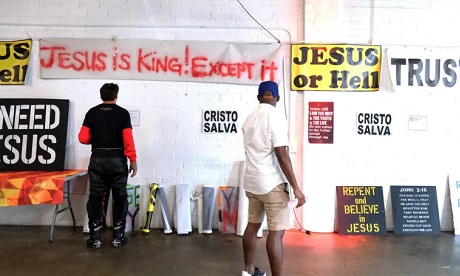It started as a small group of atheists tracking and removing religious signs from public streets in Los Angeles.
Now, this network spans more than a handful of states, with volunteers documenting and taking down illegally placed religious material on utility poles and overpasses across the country.
Known as the Atheist Street Pirates, the group formed in 2021 as a subset of the LA-based Atheists United, a nonprofit that’s been in the city for 40 years and that seeks to “empower people to express secular values and promote separation of government and religion.”
The street pirates’ goal is to clear city streets of religious propaganda.
Evan Clark, the executive director for Atheists United, created a public Google map database where the street pirates upload photos and locations of the signage they encounter during commutes.
A year ago, the map showed about 70 signs across LA County, including material taken down by the pirates or others.
The map now includes about 1,000 markers for religious signage that has been reported, tracked, or removed in such states as Texas, Tennessee, Georgia, Illinois and Kentucky. Volunteers focus on religious signs on public land, not paid billboards or signage on church property.
The documented signs on the map include banners designed with American flags declaring “Prayer Changes Things” that were attached to chain link fences and wooden panels visible from Southern California freeways.
Bright yellow “JESUS SAVES” signs also appear quite commonly in North Carolina, according to the map.
Through this work, Clark, who identifies as an atheist and humanist, said he has recognized a “larger phenomenon happening, where Christian nationalists, evangelicals and other types of religious fanatics are using our public land illegally for their proselytizing.”
On Sunday (April 23), Atheists United held an art exhibition in LA featuring signs and banners that volunteers have removed from across Southern California.
Clark said showcasing the signs this way helps show the magnitude of the issue.
Dozens of posters with the words “Jesus. The way. The truth. The life” were prominently showcased on a wall during the exhibit. These signs are the most commonly seen in LA along busy intersections, public parks and freeway off-ramps.
More than 130 have been removed, according to Atheists United.
Some of these signs are stapled and can be easily torn down, but many are placed atop telephone poles and attached with roofing nails. Volunteers have had to use a crowbar and ladder to remove some signs.
While it’s largely unknown where the signs come from, Atheists United has learned of an effort led by street evangelist Brent Farley, a born-again Christian who produces the “JESUS SAVES” posters that have been largely spotted in the South.
In an interview with Axios last year, Farley said he used to be an atheist but eventually “found God” and decided to create and distribute the signs as a way of spreading his newfound faith. “I put signs up wherever I go,” he said.
At the exhibit, Atheists United featured a dozen or so of Farley’s signs that were taken down in the LA area. Clark said they have tracked around 250 of these signs on their map.
Ted Nunn, an atheist from Texas who learned about Atheist Street Pirates through a news article, manages the map. He marks the locations of religious signs reported by the pirates or by anyone familiar with their work.
He confirms the signs and location by looking through Google street view.
Nunn, who traveled from Texas for the exhibition, said he’s not against religious people, but he has a problem with the “influence of religion in the public sphere.”
Dan Barker, a Christian minister turned atheist, understands why people would feel compelled to place this kind of religious signage. He used to do the same, he said.
“I used to think Jesus is going to come any minute now, and it’s either heaven or hell.
“So maybe there’s some little laws that are broken, but what’s more important than trying to get the message out?” said Barker, who is now co-president of the Freedom From Religion Foundation’s board of directors.
“I think most of these signs are sincere. … The people who put them up really, really believe it, or they wouldn’t go through all that trouble,” added Barker, who attended the art exhibition.
Barker noted the right to free speech, but he said this kind of religious signage — without a permit — does not belong on the “public property that belongs to all of us.”
- Alejandra Molina is a National Reporter at RNS covering Latinos and religion in the West Coast.
- First published in RNS
- Republished with permission
